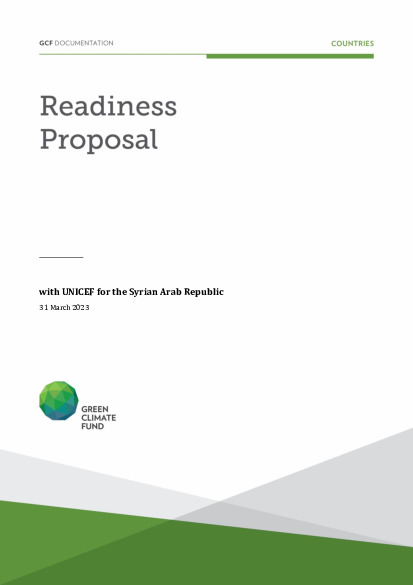Strengthening the capacity of the Water, Sanitation and Hygiene (WASH) sector to assess and address the impacts of climate change on the provision of water and sanitation services and to build the project pipeline for water and sanitation projects in the Syrian Arab Republic

Strengthening the capacity of the Water, Sanitation and Hygiene (WASH) sector to assess and address the impacts of climate change on the provision of water and sanitation services and to build the project pipeline for water and sanitation projects in the Syrian Arab Republic
The proposed readiness project aims to strengthen the water, sanitation, and hygiene (WASH) sector’s capacity to identify and address the impacts of climate change through increased understanding of risks and impacts, stakeholder capacity, engagement and coordination, and mobilisation of climate finance for the WASH sector in the Syrian Arab Republic. As the Delivery Partner (DP), UNICEF will implement this project, in partnership with UN-Habitat as an Executing Entity (EE) through an UN-to-UN agreement, under the guidance of the National Designated Authority (NDA).
Syria faces climate and economic challenges which impact the access to, and sustainability of, critical water, sanitation, and hygiene (WASH) services, impacting the lives and livelihoods of over 22 million people. Climate change is evident in increased temperatures (mean annual temperature increasing at an accelerating rate, and projected to increase by 2 oC by 2059)1 and storm frequency, and in changing precipitation intensity and timing. Syria’s WASH systems have not been designed for climate risks and are vulnerable to climate shocks, leading to interruptions or permanent destruction of WASH services and environmental contamination, regardless of the level of service. Syria’s hydropower-dependent WASH systems are also vulnerable to service interruptions due to reduced river volume and flow rates. Furthermore, security and economic crises have reduced technical and financial capacities to operate and maintain WASH infrastructure, to implement climate resilience and to operate water and energy efficient services.
The outcomes will be incorporated into Syria’s National Adaptation Plan and climate change-informed development plans for the WASH sector at national and sub-national levels.
The primary beneficiaries of this project will be key national government counterparts in MoLAE (NDA) (including the Department of Climate Change), Ministry of Water Resources (MoWR), Ministry of Agriculture and Agrarian Reform (MoAAR) at national levels, and at sub-national levels, in the municipalities/governorates of Aleppo, Lattakia, and Tartous.